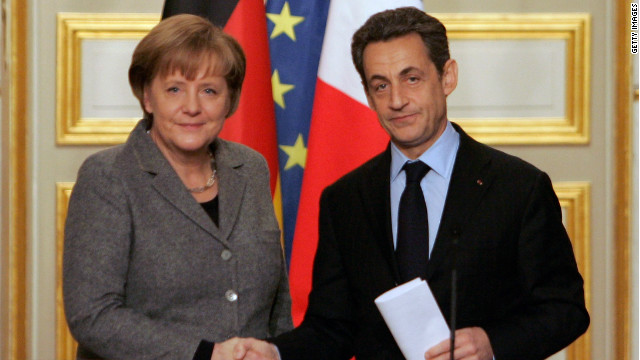By Diana Magnay, CNN
May 6, 2012 — Updated 2009 GMT (0409 HKT)
Berlin (CNN) — There has been a great deal of austerity-bashing — that is to say Germany-bashing — this French election season. Buoyed by his success in the first round, Socialist candidate Francois Hollande declared last Thursday: “It is not for Germany to decide for the rest of Europe.” Vowing to reset Europe on a growth path, he said, “we’re not just any country, we can change the situation.”
Now he looks set to put his words into action, following his apparent victory in Sunday’s runoff election.
French President Nicolas Sarkozy was quick to throw off the “Merkozy” mantel early on in his campaigning once he realized that vaunting his friendship with the German chancellor was the last thing his electorate wanted to hear, but it appears to have been in vain.
But Merkel stood by her one-time ally, saying she continued to support him in his re-election bid. This came despite increasingly anti-immigrant, protectionist rhetoric from the Sarkozy camp in order to appeal to voters on the far-right that must have sit uncomfortably with Berlin.
Much was made of the fact that the German chancellor’s office has made no official overtures to Hollande. The chairman of Germany’s Social Democrat party Sigmar Gabriel called his socialist counterpart in Paris a “victim of slander” by the ruling coalition and by Merkel personally in a recent interview with German daily Die Welt. “She knows perfectly well that it is a lie that Hollande want to scrap the fiscal compact and incur mountains of debt.”
Whether or not she is sure of that, Merkel has made it quite clear that Hollande cannot scrap the fiscal pact. Not up for renegotiation, she said. But it was also clear that Berlin recognized the writing on the wall. “Germany is clever enough to adapt its position to a new political constellation in France,” said Etienne Francois from the French Center at Berlin’s Free University. “Germans are not people to improvise.”
And Merkel has already responded with more talk of growth, although she’s at pains to argue this isn’t a new position on her part. “It is important that we break with the idea that growth always costs a lot of money and must be the result of expensive stimulus programs,” she told the Hamburger Abendblatt. The way out of this crisis has always rested on two pillars: “solid finances and measures for growth and employment.”
Hollande for his part said if he became president, his first trip would be to Berlin. This is a man who does not underestimate the strength of the Franco-German alliance. Plus he’s of a more similar temperament to the German chancellor than Sarkozy ever was. “He’s pragmatic, prepared to compromise, accepts budget discipline and he’ll be under enormous pressure from the markets,” says Claire Demesmay, French expert at the German Council on Foreign Relations. “Once the summer’s over, once the parliamentary elections have happened, he will have to start saving and he will have to push through reforms.”
For now, expect small modifications to the fiscal pact but no rewrites. “Germany will be clever enough to accept little changes in formulation in order to help Hollande tell French voters that he’s been victorious,” Francois said. “But it’s just tactics.” Merkel is already talking about more flexible use of EU infrastucture funds to spur growth, a strengthened role for the European Investment Bank. But that is a long way from meeting any future French leader on proposals such as eurobonds or a European Central Bank lending directly to governments, both anathema to Berlin.
How far the German chancellor will be forced to compromise to Hollande’s growth mantra may well depend on matters outside France. Greece was also holding elections on Sunday. Greek voters stung by austerity are turning to extremist parties on the left and right. Recession is biting across Europe, swingeing cuts making electorates restive in Spain, Portugal and Italy. The more support Hollande gets from other disgruntled eurozone countries, the less lee-way Berlin has to stick to its tough belt-tightening course.
But that is still some way off. Merkel has two crucial state elections coming up in the next two weeks and the Netherlands goes to the polls in September. If the past decades are anything to go by, it is more than likely the Franco-German alliance will remain an anchor of stability amid all the uncertainty, whoever holds the reins of power in each country.
© 2012 Cable News Network
See online: After ’Merkozy,’ what next for Europe?

